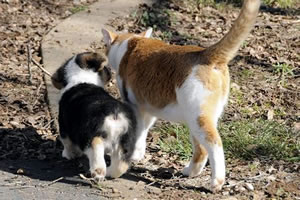General Information About Your Corgi
Frequently Asked Questions
The questions listed below are those most frequently asked by people who have, or would like to have a Corgi as a pet. The questions (and answers) are general in nature; if you have specific questions or need assistance with topics not covered here, we suggest that you contact the breeder from whom you purchased your Corgi, or, if you are still in research mode, contact a breeder in your area.
What kind of temperament do they have?
- Corgis are often described by the phrase "big dog in a small package" since they do tend to have a "big dog" outlook on life. Corgis are herding dogs, and were also bred as an "all-purpose farm dog". They tend to be loyal, sometimes protective (as is typical of the herding breeds) and most of all, live to be with their people!!
- Personality styles range from the cuddly couch potato to the energizer bunny investigator. A good breeder will try to match your lifestyle to the puppy with the right temperament.
What should I feed my Corgi and how much?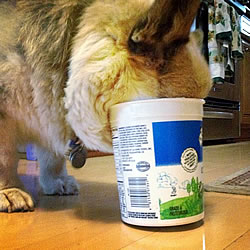
- Corgis are food efficient, and it is important to keep a Corgi in proper weight. You should consult your breeder for recommendations on what, how much and how often to feed your dog.
- Please read this excellent article by reknown breeder Susan Strickland (Honeyfox), concerning just this issue:
- "One of the big health risks for Corgis is obesity. Most of the pet Corgis I see are overweight. Since a dog's food intake is easily controlled, this should not be the case. A Corgi cannot go in the refrigerator, or open his bag of food, and make his own dinner. You have complete control over what he eats.
- A Corgi should have a waist. His ribs should be covered, but you should be able to feel them. You should never, ever, pay any attention to the huge food recommendations on dog food bags. Also, never, let me repeat that, NEVER, pay any attention to the beautiful, pleading, "I'm starving" look on your Corgi's face. Corgis are ALWAYS hungry. Feeding them more, and making them blow up like balloons will not satisfy them!
- Don't get hung up on feeding them the same amount now and forever. Amounts can vary with the seasons, and the age of the dog, and the amount of exercise he's getting."
- This article appears at www.honeyfoxcorgis.com and is reprinted with permission of the Author, Susan Strickland, All Rights Reserved. This article may not be reproduced in whole or part by any means without permission of the Author, Susan Strickland, HoneyFox Corgis
I have children. Are Corgis good with children?
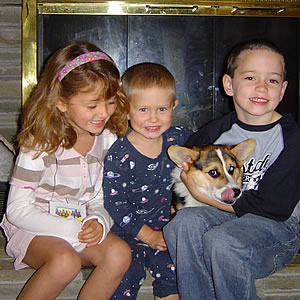
- Corgis can be great dogs with children, as long as your children are good with them! Young children should never be left alone with any dog, for the safety of both dog and child.
Which is better, a male or female Corgi?
- There is little significant difference between the sexes in terms of temperament as they all generally share a loving nature. They are, of course, individuals and, like people, have their own personalities, regardless of gender. Generally though, if you have more than one Corgi, having one of each sex tends to be the recommended route.
What colors do Corgis come in?
- Corgis come in Red and White, Sable (a darker reddish-brown with black ticking) and Tri-color (black, white and tan/red). See the colors
Are Corgis hypoallergenic?
- No, they are not!
Do Corgis shed?
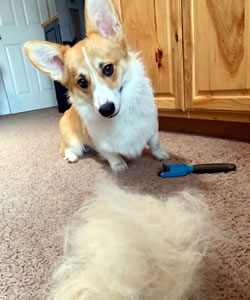
YES!
- The joke goes, "Yes, twice a year. From January to June and then from June to December." Actually the amount and timing of shedding varies greatly from Corgi to Corgi. Being double-coated, some shed copious amounts of undercoat twice a year; others shed at a slow steady rate all year long. Spaying or neutering can sometimes affect a Corgi's shedding pattern.
How much grooming does a Corgi need?
- Corgis need their nails trimmed and their coat brushed weekly. Since they sport an "all-weather" coat, it does tend to repel dirt to a certain extent, and bathing is recommended occasionally, as needed.
How much exercise does a Corgi need?
- Adult Corgis need to be walked at least twice a day (puppies more frequently) in addition to enjoying some form of playtime (ball toss, frisbee throw, etc) as well. A fit, well-built Corgi is a healthy, happy dog! One way to keep your Corgi fit, happy and focused is to learn more about and participate in performance events, of which many are listed here.
I heard Corgis get back problems easily. Is that true?
- Corgis are not long-backed dogs - they are medium-sized dogs with short legs (they are true dwarfs), giving the illusion of a long back. Keeping your Corgi fit and in good weight will help avoid many health problems.
How long will my Corgi live?
- Corgis generally live 10-15 years. However, overfeeding and lack of exercise WILL significantly shorten your Corgi's lifespan.
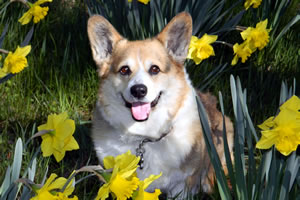
Do Corgis bark a lot?
- Some Corgis do bark a lot, others are very quiet. Some barking is a form of warning and a function of the protective nature of the breed, however, excessive barking should be addressed with proper training, especially when the dog is young - just like teaching your kids!
What is the difference between Pembroke and Cardigan Welsh Corgis?
- Pembrokes and Cardigans are two separate and distinct breeds with many differences in physical and temperament characteristics. It is beyond the scope of this forum to address all of the individual traits which characterize the two breeds. Read more about the breed standards; similarities and differences of the two types of Corgis here.
Do Corgis have any health issues?
- Fortunately, the breed as a whole tends to be very healthy. Good breeders will test for genetic health issues to which the breed is predisposed, and will discuss those with any potential purchasers.
- The Orthopedic Foundation for Animals - To do your own search for health certifications on Welsh Corgis, go to The Orthopedic Foundation for Animals, Inc. Once you've gone to OFA's site, click on "Search Database" and follow instructions to determine if dog in question has OFA clearances for hip dysplasia, elbow dysplasia, thyroid disease or heart disease.
- Information concerning health certification of the eyes can be found at the Companion Animal Eye Registry (CAER).
- Learn about von Willebrand's Disease in the Pembroke Welsh Corgi (vWD) (Thanks to Cornell College of Veterinary Medicine for this link)
I don't really want a puppy. Is it possible to get an adult Corgi?
- Breeders occasionally have adult show dogs or retired breeding animals who are looking for their "forever" home. The advantage of these dogs is they are generally very well mannered and used to many different situations. Alternatively, various Corgi rescue groups may from time to time have adult dogs looking for a new family

Puppy Questions
Why buy from a breeder?
- A breeder can and will provide evidence of genetic health testing on the parents, and will be a source of information and support throughout the life of your dog. The breeder will also provide a resource should you, at any time, be unable to keep your dog.
I was told I would get a price discount if I didn't want registration papers, is that OK?
- The American Kennel Club (AKC) stipulates that registration papers must be supplied on all purebred dogs sold. This is also set out in the AKC and the GGPWCF Codes of Ethics - thus all members must adhere to that stipulation.
A dog without registration papers is NOT considered a purebred, regardless of its lineage.
The breeder wants me to sign a contract, what does that mean?
- It is customary to have a contract/guarantee which will document the responsibilities of both the breeder and the new owner with respect to the puppy.
If I get two puppies at once will they keep each other entertained?
- General thought is that two puppies from the same litter will bond more closely with each other than with their person(s). It takes extra work to raise two puppies of a close age (rather like raising twins). Generally, raising one puppy to the point of them being housebroken and reliable before adding a second is the easiest course of action for all.
What shots should my puppy get?
- Generally, the puppy will receive its first set of shots while in the care of the breeder. Your vet should be consulted to determine the remaining vaccination schedule, and other issues such as parasite and pest control.
How old should my Corgi puppy be before I take them where they can play with other dogs?
- Puppies should be kept away from other dogs until at least their second set of shots. At that point they have partial immunity to some deadly diseases. Exposure to carefully selected playmates may be appropriate at that time. Trips to places where there may be many dogs are should be limited until 2 weeks after the 3 rd set of shots. At that point your puppy should have good immunity to a variety of communicable and deadly diseases.
How do I house-train my Corgi puppy? by Susan Strickland
- The anticipation is over, the waiting has ended, and you are on your way home with your new Corgi puppy. The fun is just beginning. Soon you'll be sitting on the floor with the pup, watching him explore his new environment, letting him climb up in your lap so you can cuddle and play games with him, and observing the cuteness that is Corgi. The laughter and smiles a Corgi brings into a home are immeasurable, but you must also be prepared to teach him the things he needs to know about life in your home. If he learns his early lessons well, his puppy-hood will be smooth sailing for both of you. Housebreaking is the first of these lessons.
- OOPS - I DIDN'T GET HIM OUT ON TIME!
- When housebreaking your puppy, you need to have him with you in the same room, so you can keep an eye on him. Use baby gates or close doors to keep him in the room.
- If you have no way to close off the room, put a line on him, and tie the end of it to your belt. Where you go, he goes. If you see him starting to go to the bathroom in the house, exclaim "AAUGH" in a startled tone, and grab him, and take him outside. You want to startle him, and grab him when he's in the act!!!
- If you find the accident on the floor after the fact, he will have no idea why you're so upset. A puppy does not understand the relationship between his owners being annoyed, the pee on the floor, and his act of peeing earlier. If you yell at your pup when you find an accident that has already happened, you may misinterpret the fact that he's slinking around as guilt. Whereas, he's upset because you're yelling. When he's older, and totally understands he mustn't go in the house, an unavoidable accident may make him feel sorry.
- Another thing to keep in mind whenever a baby puppy does anything he shouldn't, is that dogs are not born understanding the word "no". The word "no" means they've made a mistake, because it's accompanied by a correction that they find to be somewhat unpleasant. So, if you pup goes to the bathroom in the house, and you catch him in the act, and you say "No", and do nothing else, how is he supposed to know what you're talking about? "No" is only a sound. If, though, you make you exclamation of disgust, say "No", and hustle him out the door, he will begin to associate the "No" with your displeasure.
How do I house-train my Corgi puppy? by Susan Strickland
- When the pup first come home, he should be let out to go to the bathroom frequently, every couple of hours, and whenever his activity changes.
- Let him out immediately when he wakes up, immediately after eating, when he's been playing hard, and when you see him looking around in the perimeter of his area.
- Even when he starts to understand that he should go outside, don't expect him to go to the door and tell you when he needs to go out.
- That's not his responsibility. It's up to you to make sure you let him out regularly, so he doesn't have accidents.
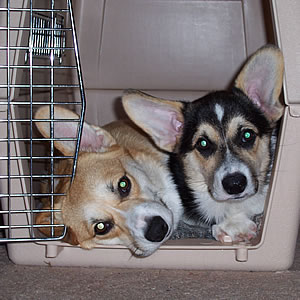 The crate is the best place for the pup when you can't watch him, because they don't like to go and then have to sit in it. Don't leave the pup in the crate for a period longer than he can physically wait, or you will teach him not to trust you to come back in time, and he'll stop trying to wait.
The crate is the best place for the pup when you can't watch him, because they don't like to go and then have to sit in it. Don't leave the pup in the crate for a period longer than he can physically wait, or you will teach him not to trust you to come back in time, and he'll stop trying to wait.- Very young pups should be carried outside when taken out of the crate so they don't go on the way to the door. Before bedtime try to tire the pup out, and take him out last thing before being putting him in the crate.
- Picking up the water at some point in the evening, so he doesn't drink to much right before bed, is also a good idea.
- If he cries in the night to go out, take him out, and put him right back in the crate.
- Not only is the crate great for housebreaking but you get lots of side benefits from it. Crates teach dogs how to be alone without being fussy, how to be quiet while you go about doing things you don't want them involved in, and it's also a safe place for them when you go out.
- This article appears at www.honeyfoxcorgis.com and is reprinted with permission of the Author, Susan Strickland, All Rights Reserved. This article may not be reproduced in whole or part by any means without permission of the Author, Susan Strickland, HoneyFox Corgis



